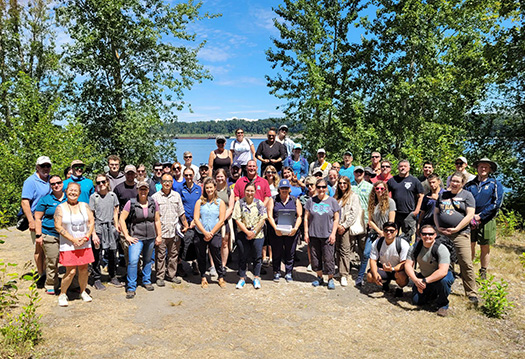Pacific Northwest Region Benefits from NOAA Oil Spill Science Training
JULY 24, 2023 — During the week of July 10, spill specialists from OR&R’s Emergency Response Division conducted a Science of Oil Spills (SOS) class for the Pacific Northwest region in Portland, Oregon. The class was jointly hosted by OR&R and the Oregon Department of Environmental Quality (DEQ).

Led by the NOAA scientific support coordinator (SSC) for the Northwest, CDR Faith Knighton, the instructor team included oceanographer Dylan Righi, chemist Dalina Thrift-Viveros, SSC Supervisor Doug Helton, scientist emeritus Gary Shigenaka, and facilitator Nickie Scillo.
The 46 students attending the class represented a wide variety of federal agencies, such as the U.S. Coast Guard, NOAA, the Pipeline and Hazardous Materials Safety Administration, the Centers for Disease Control and Prevention, and the U.S. Department of the Interior. From state agencies, students attended from Oregon, Washington, Alaska, California, Hawaii, and Texas. Also participating were representatives from the sovereign nations of the Makah, Swinomish, and Confederated Tribes of the Umatilla Indian Reservation; the Saipan Bureau of Environmental and Coastal Quality; Guam Power Authority; and Chevron.
Among the topics covered in OR&R’s SOS classes are oil chemistry, oil fate and transport, observations of oil, spill cleanup alternatives, damage assessment and restoration, and the history of oil spills.
For this class, Scott Smith, Spill Contingency Planner with the Oregon DEQ, served as a local expert, presenting on the habitats and unique convergence characteristics of the Columbia and Willamette Rivers. The class was taught using a scenario-based exercise of an allision of a tanker vessel with the footing of the Astoria Bridge on the north edge of the shipping channel of the Columbia River. This scenario allowed the students to ask relevant science-based questions and put lectures into practice with in-class and field activities related to the scenario. Nat Scholtz, from NOAA’s Northwest Fisheries Science Center, accompanied the students on a field trip to Kelley Point State Park where the students reinforced some of the lessons, discussing Shoreline Cleanup Assessment Technique (SCAT), marine ecology, and oil spill trajectories.
OR&R extends appreciation to several other subject-matter experts who presented on their particular field of expertise: David Bishop with the NOAA National Weather Service; Chris Boring, a NOAA contractor with Research Planning, Inc.; John Incardona with NOAA Fisheries; Sonja Larson with the Washington Department of Ecology; Hanna Miller with the NOAA Fisheries Protected Resources Division; and Don Noviello with the Washington Department of Fish and Wildlife.
